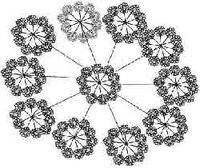Template:Community Types
Communities may be broken down into a a variety of types along several different formats.
Things that will divide or define communities into types are purpose, membership limitation and form requirements as well as egalitarian[1] perimeters verses archial, governing methods including laws and customs. All three of these elements will help define its structure. Ultimately society may be classified as free or bond based on the liberty of the people who count themselves as members of a society.
Purpose
The purpose of community is often for mutual protection besides the obvious gregarious nature of mankind which inherently yearns for a Sense of Community. But the attitude and values of the people will determine the bonds of society.
Economy plays a natural roll in the function and operation of a community and the means by which economy function as well as the laws and customs that is used to settle disputes will play an influential part in the life and success of a community. Are the people in possession of their property or does society count the possessions of the people as pare of one purse?
The Golden calf and other systems of Public religion or Private welfare may alter the course of society. The Corban of the Pharisees and other Welfare types altered the course of society and the character of the community.

Membership
Membership includes a common purpose which each member must concur with in one form or another such as mutual protection. The manner in which community duties are fulfilled defines the society as free or bond.The original phrase "right to bear arms" meant the obligation to bear arms in defense of the community. Others communities may have a religious format or theme such as Jewish or Christian themes.
Others may be based on themes such as Ecovillages or Sustainable communities. other themes may include voluntary simplicity, interpersonal growth, and self-sufficiency, service to the poor.
The laws and customs may enforce membership requirements in several ways. All these factors are enter related and play upon each other. They also will play upon the members of the community. The form and practices of your community will alter the members as much as the members will alter the form and practices.
Ultimately the moral spirit of the members will define the community more than any thing else although the form and manor by which a community structures itself will not only draw certain types of people and spirit it will by its nature cultivate certain types of moral behavior and spiritual personification.
How society structures itself concerning the intersection of organic members of society plays a vital or destructive factor. Liberality in one area may require stricter adherence in another area of interaction to maintain balance.
As an example Optimize the intersection points of society mentioned in Community_Ethics has to do with the day to day contact within a community. People need their own space and if society decreases the privacy of society members in one area they may need to increase it it in another to maintain balance.
Cohousing generally incorporate both private homes or quarters and shared common facilities and support neighborly connections.
Communes often include 100% income sharing, central leader or hierarchy.
Co-ops may have a general expense sharing especially in industry or other enterprises, or even shared housing communities. Many communities have coops supplying water or power or even road maintenance but the families are quite separate otherwise.
Other aspects of a community may differentiate them based on the system of laws or rights of the individuals and the limitation upon governing powers.
One of the most defining elements of a community, both internally and to the rest of the world, is its purpose or purposes.
Form
Laws and customs and the method of establishing them define the form of government. Some customs are based on the interrelations of family according to living arrangements like Cohousing, Communes, and Co-ops. Others will be economic which allows wealth to be stored with individuals and families along with the laws that protect the individuals property rights in that stored wealth.
Liberty is the Natural state of mankind. All naturally endowed rights are found in the law of nature. Legal systems by their nature distribute natural rights into legal forms. when creating the legal structure of society it is essential to maintain balance.
Centralizing some rights will altar society and there must be a correlative balance established so as not to dilute the original rights of the individual. This is done by maintaining a right to choose and granting power to titular leaders in the form of power over a thing and not over the people. This unique way of distribution of right has been called a Republican Form of government. See Viable_republic
- ↑ egalitarian of, relating to, or believing in the principle that all people are equal and deserve equal rights and opportunities.